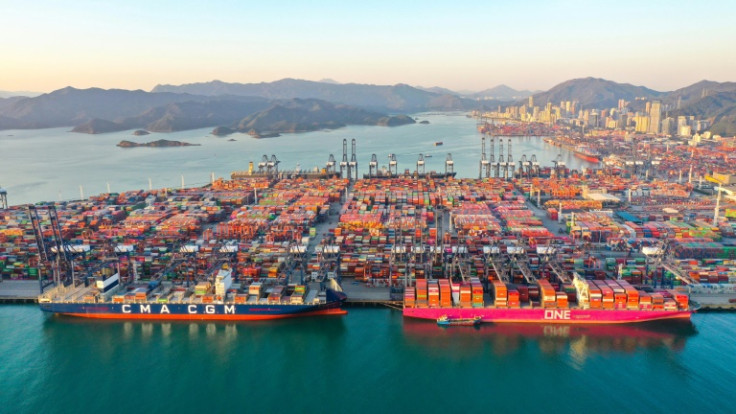China Imports, Exports Plunge In December: Customs

China's exports in December fell at their fastest pace since 2020, according to official data Friday, owing to a drop in global demand and after health restrictions hit economic activity at home.
The world's second-largest economy is still reeling from the effects of years of its zero-Covid policy, which hammered businesses and supply chains, and dampened consumption.
China began lifting most of the hardline measures at the beginning of last month, but the country has since seen a massive spike in Covid-19 infections.
Exports fell 9.9 percent year-on-year to $30.6 billion, China customs said, their second consecutive month of decline and the biggest fall since the early days of the pandemic in 2020. That followed a fall of 8.7 percent in November.
Exports had been the main driver of China's economy since 2020, when the global shutdown led to strong demand for Chinese goods such as medical products, and then as the rest of the world reopened.
The uncertainties linked to Covid and the economic slowdown in China are having an impact on the need for foreign products.
Imports were down again in December, sinking 7.5 percent, following a 10.6 percent drop the previous month. Both imports and exports dropped much more than forecast in a survey of economists by Bloomberg.
For all of 2022, the Asian giant's exports rose 7.0 percent, compared with a 29.9 percent jump in the previous year.
Imports for 2022 were up 1.1 percent, against a 30.1 percent rise in 2021 when activity in China was recovering from the first wave of the pandemic.
China's trade surplus in December nevertheless reached $78 billion, but still well below July's record $101.2bn.
China will unveil its 2022 economic growth figure on Tuesday, along with a host of other indicators. The previous year gross domestic product grew more than eight percent.
Beijing had set itself a growth target of around 5.5 percent for 2022, but that has been undermined by the stifling zero-Covid health policy that was in place for most of the year.
Larry Hu, an analyst for the Macquarie investment bank, said: "For the whole year of 2023, the weak global economic environment could be a major downside risk to the Chinese economy."
And Zhiwei Zhang of Pinpoint Asset Management wrote in a note: "Both the weakening global demand and the wave of Covid outbreak likely contributed to this decline.
"The weak export growth highlights the importance of boosting domestic demand as the key driver for the economy in 2023."
© Copyright AFP 2024. All rights reserved.





















